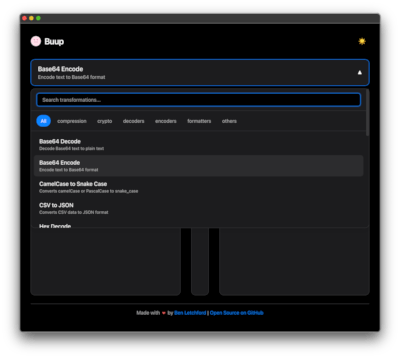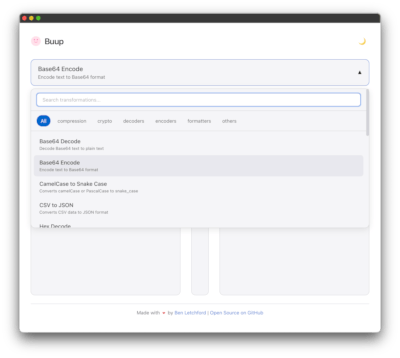20 breaking releases
| new 0.23.0 | May 17, 2025 |
|---|---|
| 0.21.1 | May 17, 2025 |
#117 in Text processing
2,225 downloads per month
395KB
9K
SLoC
Buup - The Text Utility Belt
Buup is a versatile text transformation toolkit that provides a dependency-free core library and CLI for common text manipulations like encoding/decoding, formatting, cryptography, (coming soon compression/decompression), and more written in pure dependency-free Rust.
It is designed to be a simple, lightweight, open, secure, provably fast and easy to integrate.
Drop-in replacement for all of those dodgy online text transformation tools you've ever used in the past except the batteries are included (and they are all in pure Rust).
It includes a web application which is of course written in pure Rust (WASM via Dioxus) as a separate workspace member.
Key Features
- Zero Dependencies: The core
buuplibrary and its CLI implement all transformations without external dependencies - Multiple Interfaces: CLI for terminal workflows and Web UI for interactive use
- Extensible Design: Easy to add new transformers by implementing the
Transformtrait - Strong Typing: Full type safety with comprehensive error handling
- Thread Safety: All transformers are designed to be safely used concurrently
- Performance: Optimized for speed and memory usage
Ways to Use Buup
Buup offers three distinct ways to transform your text:
1. Web Application
A modern, responsive web application for interactive text transformations proudly built with Dioxus.
| Dark Mode | Light Mode |
|---|---|
 |
 |
From source:
# Serve the web UI (requires Dioxus CLI)
cd buup_web
dx serve
Build for production:
dx build
2. Command Line Interface
Zero-dependency CLI for quick transformations in your terminal workflows.
# Installation
cargo binstall buup # or cargo install buup
# List available transformers
buup list
# Examples
buup base64encode "Hello, world!" # Encode text directly
buup urldecode -i encoded.txt # Decode from file
echo "Hello" | buup hexencode # Pipe from stdin
3. Rust Library
Integrate Buup's transformers directly into your Rust applications.
# Add to your project
cargo add buup
use buup::{transformer_from_id, Transform, Base64Encode};
// Option 1: Use a specific transformer struct
let encoded = Base64Encode.transform("Hello, Library!").unwrap();
println!("{}", encoded); // SGVsbG8sIExpYnJhcnkh
// Option 2: Look up a transformer by its ID
let transformer = transformer_from_id("base64decode").unwrap();
let decoded = transformer.transform(&encoded).unwrap();
println!("{}", decoded); // Hello, Library!
Tiny Binary Size
Buup is incredibly lightweight, with the entire buup library of transformers and the CLI binary compiling down to just 636K on arm64 (again with no external dependencies).
This tiny footprint makes Buup perfect for:
- Including in resource-constrained environments e.g. embedded systems
- Fast startup times for CLI operations
- Minimal dependencies means fewer security vulnerabilities and simpler maintenance
Note: Binary size may vary slightly across different platforms.
Available Transformers
The following transformers are currently available in Buup:
Available transformers:
ENCODERS:
ascii_to_hex - Convert ASCII characters to their hexadecimal representation.
base64encode - Encode text to Base64 format
bin_to_hex - Convert binary numbers to hexadecimal.
binaryencode - Encode text into its binary representation (space-separated bytes).
dec_to_bin - Convert decimal numbers to binary.
dec_to_hex - Convert decimal numbers to hexadecimal.
hex_to_bin - Converts hexadecimal input to its binary representation (Base64 encoded).
hexencode - Encode text to hexadecimal representation
htmlencode - Encodes special HTML characters into their entity representation (e.g., < to <).
morseencode - Encode text to Morse code
rot13 - Applies the ROT13 substitution cipher to the input text.
urlencode - Encode text for use in URLs
DECODERS:
base64decode - Decode Base64 text to plain text
bin_to_dec - Convert binary numbers to decimal.
binarydecode - Decode space-separated binary representation back to text.
hex_to_ascii - Decodes a hexadecimal string into its ASCII representation.
hex_to_dec - Converts hexadecimal numbers to their decimal representation.
hexdecode - Decodes a hexadecimal string into its original bytes, then interprets as UTF-8.
htmldecode - Decodes HTML entities (e.g., <) back into characters (<).
jwtdecode - Decodes a JSON Web Token (JWT) without verifying the signature.
morsedecode - Decodes Morse code into text.
urldecode - Decode URL-encoded text
FORMATTERS:
htmltomarkdown - Converts HTML to Markdown format
jsonformatter - Formats (pretty-prints) a JSON string.
jsonminifier - Minifies a JSON string, removing unnecessary whitespace.
linenumberadder - Adds line numbers to the beginning of each line.
linenumberremover - Removes line numbers (and optional delimiters) from the beginning of each line.
markdowntohtml - Converts Markdown text to HTML format
sqlformatter - Formats SQL queries with proper indentation and spacing
sqlminifier - Minifies SQL queries by removing unnecessary whitespace and formatting
xmlformatter - Format XML code with proper indentation
xmlminifier - Compress XML by removing unnecessary whitespace
CRYPTOGRAPHY:
md5hash - Calculates the MD5 hash of the input string.
sha1hash - Computes the SHA-1 hash of the input text (Warning: SHA-1 is cryptographically weak)
sha256hash - Computes the SHA-256 hash of the input text
uuid5_generate - Generates a version 5 UUID based on namespace and name using SHA-1. Input format: "namespace|name". Namespace can be a UUID or one of: dns, url, oid, x500.
COMPRESSION:
deflatecompress - Compresses input using the DEFLATE algorithm (RFC 1951) and encodes the output as Base64.
deflatedecompress - Decompresses DEFLATE input (RFC 1951). Expects Base64 input.
gzipcompress - Compresses input using Gzip (RFC 1952) and encodes the output as Base64.
gzipdecompress - Decompresses Gzip formatted input (RFC 1952). Expects Base64 input.
COLORS:
hex_to_hsl - Converts hex color code to HSL format
hex_to_rgb - Converts hex color code to RGB format
hsl_to_hex - Converts HSL color to hex format
hsl_to_rgb - Converts HSL color to RGB format
rgb_to_hex - Converts RGB color to hex format
rgb_to_hsl - Converts RGB color to HSL format
OTHERS:
cameltosnake - Converts camelCase or PascalCase to snake_case
color_code_convert - Converts between different color formats (HEX, RGB, HSL, CMYK)
csvtojson - Converts CSV data to JSON format
jsontocsv - Converts a JSON array of objects into CSV format.
linesorter - Sorts lines alphabetically.
slugify - Converts text into a URL-friendly slug (lowercase, dashes, removes special chars)
snaketocamel - Converts snake_case to camelCase
text_stats - Calculates basic text statistics (lines, words, chars, sentences)
textreverse - Reverses the input text
uniquelines - Removes duplicate lines, preserving the order of first occurrence.
urlparser - Parses a URL into its components (scheme, authority, path, query, fragment)
uuid_generate - Generates a version 4 UUID. Input is ignored. WARNING: Uses a non-cryptographically secure PRNG.
whitespaceremover - Removes all whitespace (spaces, tabs, newlines) from the input text.
EXAMPLES:
buup base64encode "Hello, world!" # Encode text directly
buup urldecode -i encoded.txt # Decode from file
echo "Hello" | buup hexencode # Pipe from stdin
Update README.md with buup list
cargo run --bin update_artifacts
Contributing
Contributions are welcome! When adding new transformers or modifying code, please ensure:
- Zero external dependencies in the core
buuplibrary - Comprehensive tests covering functionality and edge cases
- Clear error handling using
TransformError - Run
cargo test --workspaceandcargo clippy --workspace -- -D warnings
Creating Custom Transformers
Basic Structure
To create a custom transformer:
- Create a new struct that implements the
Transformtrait - Add the struct to the registry in
lib.rs
Step 1: Example Implementation
Here's a simple example of a custom transformer that reverses text:
use buup::{Transform, TransformError, TransformerCategory};
/// Text Reverse transformer
#[derive(Debug, Clone, Copy, PartialEq, Eq)]
pub struct TextReverse;
impl Transform for TextReverse {
fn name(&self) -> &'static str {
"Text Reverse"
}
fn id(&self) -> &'static str {
"textreverse"
}
fn category(&self) -> TransformerCategory {
TransformerCategory::Other
}
fn description(&self) -> &'static str {
"Reverses the input text"
}
fn transform(&self, input: &str) -> Result<String, TransformError> {
Ok(input.chars().rev().collect())
}
fn default_test_input(&self) -> &'static str {
"Example Input"
}
}
Step 2: Add to Registry
In lib.rs, add your transformer to the register_builtin_transformers function:
fn register_builtin_transformers() -> Registry {
let mut registry = Registry {
transformers: HashMap::new(),
};
// ... existing registrations ...
// Import your new transformer struct
use crate::transformers::my_transformer::MyNewTransformer;
// Add your new transformer instance
registry.transformers.insert(MyNewTransformer.id(), &MyNewTransformer);
registry
}
Step 3: Export Your Transformer (Optional)
If your transformer will be used directly, add it to the exports in transformers/mod.rs:
// src/transformers/mod.rs
mod base64_decode;
// ... other mods ...
mod my_transformer; // Your new module
pub use base64_decode::Base64Decode;
// ... other uses ...
pub use my_transformer::MyNewTransformer; // Your new transformer
Step 4: Add Inverse Support (Optional)
If your transformer has an inverse operation, update the inverse_transformer function in lib.rs:
pub fn inverse_transformer(t: &dyn Transform) -> Option<&'static dyn Transform> {
match t.id() {
// ... existing matches ...
"my_encoder" => transformer_from_id("my_decoder").ok(), // Your transformer pair
"my_decoder" => transformer_from_id("my_encoder").ok(), // Your transformer pair
_ => None,
}
}
Tips for Creating Good Transformers
- Follow the naming convention of existing transformers
- Provide clear and concise descriptions
- Make sure your transformer is thread-safe (impl Sync+Send)
- Consider implementing pairs of transformers for inverse operations
- Add comprehensive tests for your transformer
